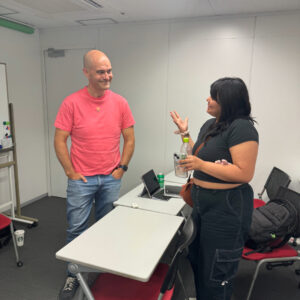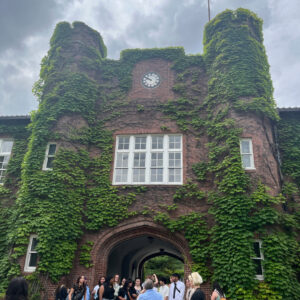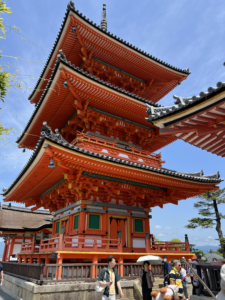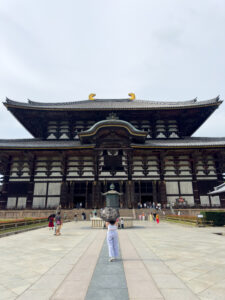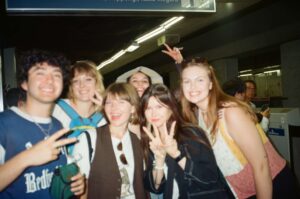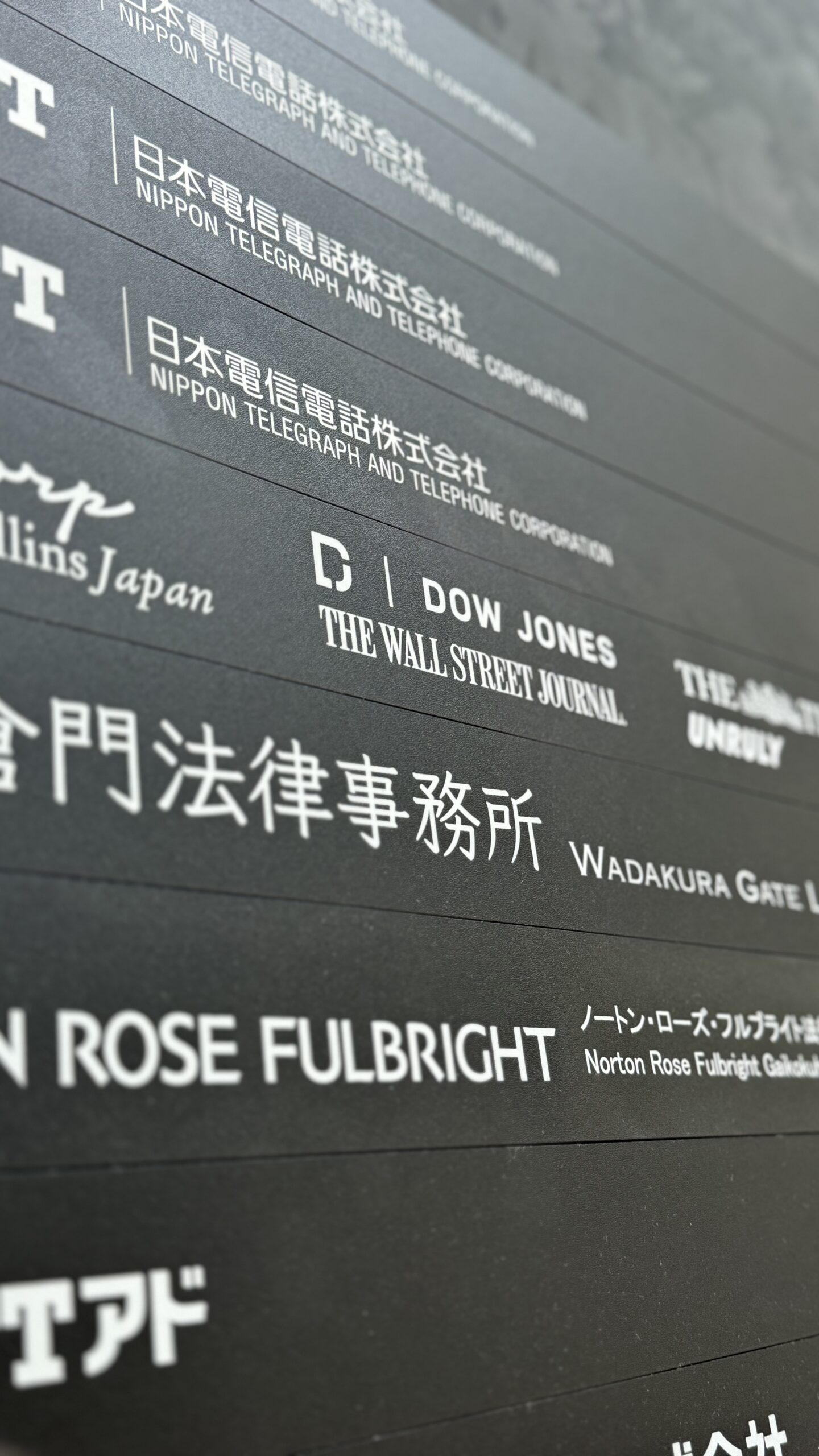
SJMC Japan’s highly anticipated visit to the Wall Street Journal‘s Tokyo bureau was a highlight of the group’s trip.
Exploring the inner workings of the publication’s operations and strategies and meeting Peter Landers, Tokyo bureau chief, inspired students and provided fascinating insights into the industry.
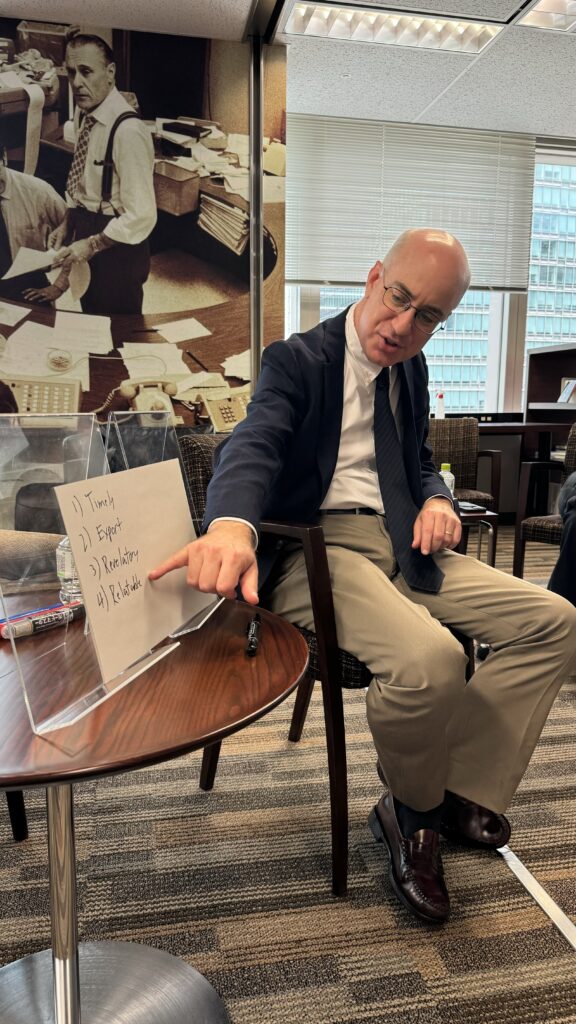
The Wall Street Journal is a leader in business journalism. The newspaper was founded in 1889 by Charles H. Dow, Edward Jones and Charles Bergstresser and evolved from its humble beginnings into a global news source. It is known and respected for its detailed reporting on business and economic affairs. Its influence extends well beyond Wall Street, offering in-depth analysis of the complex dynamics of global markets, politics and society.
A veteran journalist and editor with over two decades of experience at the WSJ, Landers joined the WSJ as a Tokyo correspondent in 1999. He later moved to the U.S. to take on several editorial roles before returning to Japan in 2014 as the bureau chief. As a Yale graduate, with a focus on classics and Japanese, Landers brings a nuanced perspective to his role, combining deep cultural knowledge with his journalistic expertise.
The WSJ was initially developed due to a need for reliable financial news about the New York Stock Exchange. Its first issue, published on July 8, 1889, primarily focused on business and economic news. Over time, it expanded its coverage to include feature articles on various subjects. This expanded coverage continues, and today, the WSJ covers a wide array of topics, including politics, international relations and cultural trends.
In 2007, Rupert Murdoch’s News Corporation acquired Dow Jones & Company, the WSJ’s publisher, marking the beginning of a new era of expansion and innovation. This included launching initiatives like the Wall Street Journal Europe Future Leadership Institute; a partnership with business schools and universities across Europe, aimed at increasing readership and nurturing future business leaders, and WSJ, an international lifestyle magazine. These initiatives aimed to broaden its appeal and enhance its coverage beyond the traditional business realm.
During SJMC Japan’s visit to the WSJ Tokyo bureau office on June 7, Landers shared insights into the publication’s operations, the challenges of modern journalism and the strategic direction set by Emma Tucker, the first female editor-in-chief in the paper’s 135-year history.
Tucker, who took the reigns in December 2022, was instrumental in leading the WSJ toward a more modern and engaging approach. According to Landers, Tucker emphasizes four key elements in the newspaper’s coverage: timeliness, expertise, revelatory content and relatability.
These journalistic principles aim to ensure that the WSJ remains a trusted and reputable news source in an era where information is abundant and often free. When news organizations first added content online, many provided access for free, but the Wall Street Journal has always maintained a pay wall.
“It’s hard to summarize our mission in a few words,” Landers said. “But I think some of that is about the relatable element of it.”
Landers emphasizes timeliness as a crucial element in today’s fast-paced news environment. The WSJ operates around the clock with global teams to ensure that breaking news is reported both accurately and promptly. However, as Landers pointed out, timeliness is not limited to immediate news; it also extends to features and profiles, relevant to the current news cycle.
In its early days, the WSJ adhered to a five-day publishing schedule, taking weekends off to provide its reporters and readers a break. However, the relentless pace of the 24-hour news cycle brought on by the digital age necessitated a significant need for increased coverage. The Journal, adapting to the demands of continuous news coverage, evolved into a round-the-clock operation, ensuring its readers are always informed.
“We have a new slogan,” Landers said. “The Wall Street Journal: It’s your business.”
Landers highlighted that although timeliness is vital, ensuring the accuracy of information, even if it delays reporting, is necessary to maintain the publication’s high journalistic standards.
“You just have to be extra careful and sometimes sacrifice a little bit of the timeliness portion of our mission,” Landers said. “There’s just so much contradictory information flying about what we do, more in the Tokyo bureau or in Asia.”
Expertise is another fundamental tenet of Tucker’s vision. The WSJ prides itself on having reporters who are knowledgeable about the subjects they cover. This expertise allows the Journal to provide in-depth analyses and insights that set it apart from other news organizations.
“[Expertise] is an important element to distinguish our coverage from other news organizations that may not have the same experience in covering business and finance economics,” Landers said.
Revelatory journalism, or uncovering new and exclusive information, is vital for retaining subscribers. In an era where much of the news is commodified and available for free, the WSJ’s ability to break exclusive stories gives readers a compelling reason to subscribe.
“Scoops are a key part of what we do,” Landers said. “More important maybe than 25, 30 or 100 years ago, because it gives people a reason to pay for our product.”
Relatability is perhaps the most challenging aspect for a business-focused publication. The WSJ aims to make complex subjects accessible and interesting to a broad audience. This involves profiling people in the news, explaining intricate topics like semiconductors in understandable terms and connecting stories to readers’ lives.
“We want to make our stories relatable,” Landers said. “That means writing about the people in the news and [finding] interesting angles, trying to connect with subjects that readers know and then maybe introducing them to something new.”
As the Tokyo bureau chief, Landers oversees a team that covers various topics, from business and finance to technology and international relations. The challenge, he explained, is making stories about Japanese companies and events relatable to an American audience. For example, while a Japanese app like Line might be significant locally, the WSJ must find relevant angles for its primarily American readership.
Landers also highlighted the rigorous process of verifying information, especially in conflict zones or areas with limited access. He shared an anecdote about the careful verification process during the Ukraine war, where the WSJ was cautious about reporting unconfirmed news, even at the risk of being late.
“It’s an extra burden I think in that case, at least to the editors,” Landers said. “To say we’re talking to people who do know it is accurate information. It’s not fake news, it’s not propaganda. And I think, usually we get it right but you can’t be perfect.”
In today’s digital age, the WSJ faces significant competition from free news sources. To differentiate itself, it focuses on the quality and uniqueness of its content. Landers notes that while the WSJ brand is powerful, it’s the quality of the journalism that ultimately sets it apart.
The WSJ also employs a dynamic paywall, using algorithms to determine which articles to make accessible to non-subscribers. This strategy helps attract potential subscribers while maintaining the value of the content for existing ones.
In addition to traditional reporting, the WSJ has embraced video and multimedia as part of its content strategy. The Journal produces a range of video content, from short news clips to longer documentaries. These videos provide an additional layer of depth and engagement, complementing the written articles.
Landers mentioned a 40-minute documentary about Yevgeny Prigozhin, the founder of the Wagner private mercenary group, a Russian state-funded private military company. This documentary offered detailed insights and analysis, showcasing the WSJ’s ability to produce high-quality multimedia content.
Visiting the Wall Street Journal’s Tokyo bureau offered a fascinating glimpse into the world of international journalism. The sleek skyscraper in downtown Tokyo was a hub of activity, with reporters deeply engrossed in their work. Contrary to the bustling, noisy newsroom one might expect, the office was remarkably quiet, reflecting the focused and meticulous nature of the newspaper’s reporting process.
“It was really an amazing experience,” electronic media senior Kaylie Kruk said. “Peter gave us a lot of really good information about the Wall Street Journal. It really solidified what I want to do in the future.”
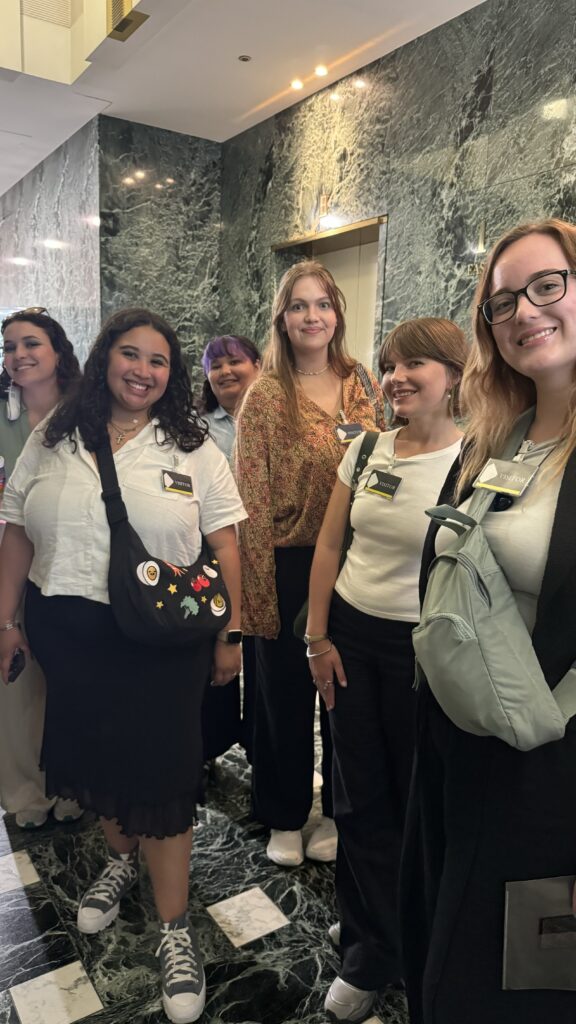
Some students outside of the journalism realm found the experience enriched their understanding of the media’s global significance and influence.
“It offered me a firsthand glimpse into the world of international journalism,” international relations senior Elian Reyes said. “This experience deepened my understanding of global affairs and the importance the media plays in shaping policy.”
Other students were inspired by Landers’ success abroad.
“I felt encouraged by the success of someone from the U.S. living and working full time in a foreign country,” advertising junior Lauren Reid said. “It gave me more confidence in goals I wish to pursue after the study abroad experience.”
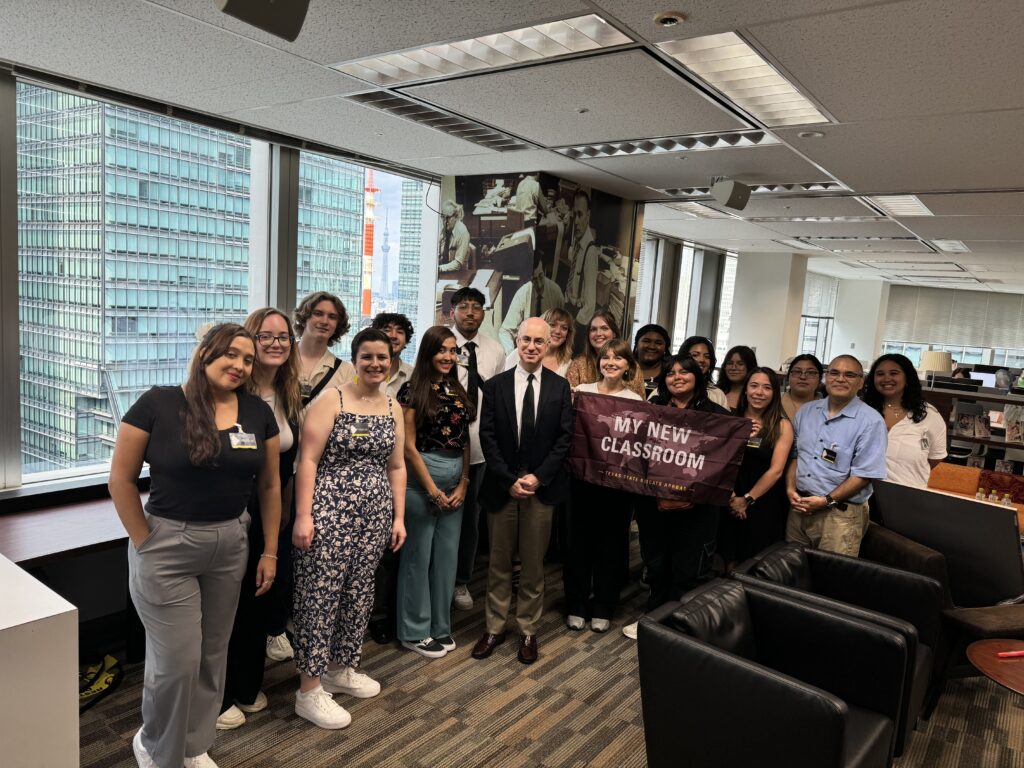
Looking ahead, Landers acknowledges the challenging economics of the news industry. Despite the profitability of the WSJ, the broader media landscape is plagued with difficulties. Free publications, in particular, face significant hurdles as platforms like Google increasingly provide direct answers to queries, reducing the need for users to visit news websites.
Landers remains optimistic about the future, despite the challenges facing the news industry. He believes there will always be a demand for high-quality journalism that offers nuanced insights and thorough analysis. While AI and automated systems can handle certain tasks, they cannot replicate the investigative reporting and expert analysis that the WSJ offers.
The WSJ aims to continue its tradition of excellence, adapting to the changing landscape while maintaining its newly defined core values of timeliness, expertise, revelatory journalism and relatability.
SJMC Japan took these fundamental values to heart as they pondered their career paths and the future in a rapidly evolving digital landscape.
